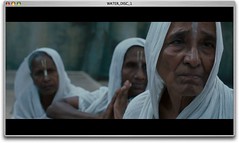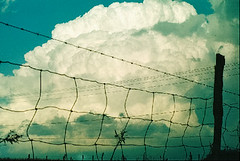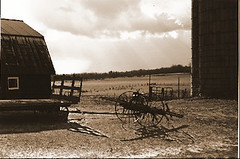Water (2005)
Dir. Deepa Mehta Writ. Deepa Mehta
w/ Sarala, Lisa Ray, Seema Biswas, Kulbhushan Kharbanda, John Abraham, Vinay Pathak, and Waheeda Rehman
Stories take on a life of their own. The truest story is the simplest gesture, capable of betraying the greatest depth of feeling while also conveying the complex of nature of life. This can be as elementary as a mother peeling potatoes for a famished, captive audience or an anxious husband preparing a cold compress for his feverish wife. The moments these tasks take appear profound, monumental. In many ways, Deepa Mehta's Water reflects her intuitive sense of storytelling, but too tragic a history has hamstringed her full potential to tell it well. Her film's riddled with the woes of a culture on the precipice of a change that did not and has not reached all the strata of its society any more than Gandhi made true believers of all of his people. Foregoing for the moment any detailed understanding of Hinduism or Indian culture, the plight of women in a religious austerity that doesn't necessarily hold its men to the same rigidity at very least translates well to the Western grasp of relationships and the presence of imbalance.
Not unlike the songs of Solomon, the Ancient Vedas -- the poetic basis upon which ashrams have become a customary part of Indian society, and the film's focal point -- put women on a pedestal of virtue that most humans would agree is a tough row to hoe. With specific evils befalling women who do not toe that ascetic line, though, the Vedas go beyond the realm of the early Jewish poets. Where Solomon and David after him felt on safe ground praising the idyllic, virtuous woman -- not coincidentally often a frugal one, easily adaptable to the rigors those in nomadic, uncertain times faced -- the Indian poets seem to have instilled a stronger sense of justice into their writings when evoking karma. Perhaps realizing that she would be trying to reach an audience more accustomed to open, interpretable Scriptures, one in which God and not a poet had the final say, Mehta stays close to those things common to both East and West.
Both hemispheres value the happiness of children. Both admire the pursuit of dreams. Possibly as a result of the indelible mark of British Imperialism, India seems to have the same weakness for tragic love stories that many Westerners have likewise inherited from the same sector. And both have an Industrial Machine constantly churning out fodder to compete with The Last Greatest Thing Since You Can't Remember When. Thankfully, Mehta's work doesn't pander to the ranks and files of Hollywood any more than it does to Bollywood; it does, however, hit you over the head at times with its message. I'd hesitate to label it preachiness. What I think's really happening is a sizable mistrust that her audience will understand the most important thrust of her film. As agenda art, if you will, it's very powerful in ways that have not even been broached yet; as the fine, spoonful of sugar that critics so long for when dealing with an epidemic of misogyny, it's disconcerting and a bit hard to take.
The first question that comes to mind is why, if the abject cruelty to widows in India is so important, did the filmmaker choose fictitious film as her medium? Why not a documentary?The answer may be as facile as roving differences in ticket sales between non-fiction and feature films, an evolving thing since Robert Redford launched Sundance Cinemas and instituted the House of Docs as a permanent part of his annual film festival. Although the public response to such ventures has risen, along with the visibility of such filmmakers, the change has been dramatic without being sufficiently encouraging. Westerners still seem to prefer their movies fake, entertaining, and -- more often than not -- a tad schmaltzy. So let's discuss Water for what it is: a piece of timely art that attempts to span an intimidatingly wide cultural and societal gap using little more than the universal truths and echoes found in all stories involving humans, and a medium that nearly every country in the world has now at least begun to test.
At the foreground, Chuyia, the newest acquisition in a house of widows or ashram, presents us with everything one could ask for in a heroine. She possesses spunk in spades and a child's clairvoyant honesty that calmly puts the illusory in its place by asking for a second helping of reality. In the very first scene, her dying husband lays just behind her on a cart as her family treks homeward. All Chuyia can think to do is enjoy the spacious view around her, gnaw on something particularly sweet, and thump the dying man's foot. Such deft characterization is not only Mehta's forté; it's also her wordless argument. The child can not remember being married, but she will spend the rest of her life in an ashram to serve the customs of her people. This ironic metaphor serenades the essential landscape of the film, that remembered sweetness of the wedding feast without the just desserts of a wedding night. As a widow in their midst, despite her youth, Chuyia's accorded the same sympathy and respect sisters grieving would give each other matter of course; but, by way way of human predictability, she also shares their blows.
That's precisely the point Mehta harps on again and again, this monstrous degredation to which women in captivity become subjected and eventually used to, treating each other in a variety of ways less dignified than wouldv'e been witnessed in their former lives. As widows, they are meant to comfort each other in their grief. Not only have they been forsaken by a God they once trusted to bless them with children and a home, but they have been insulted by a husband who chose to leave them behind rather than spend as much of this life with them as possible. It recalls the Native American belief that aborted babes, and not their mothers, choose to dwell on this earth or not. That Western difference in thinking that we are so very in control of all of our choices touches the depths of this film's more intuitive perspective on life.
Since not all women are the same, each copes with her situation as she can. The virtue of each woman expresses itself in the way she views herself, as the victim or survivor of a bad beat. The lines get blurred in places, but that line of distinction remains Mehta's crux as she attempts to appeal to the sentiments of a society so fundamentally different from our own. The attempt even works, as one of the women takes Chuyia under her wing to teach her to cope and to protect her from being used by a widow who has turned sour. An element of alienation also stalks the screen. As the women struggle to survive, we see Mehta's firm belief emerge that Chuyia, although strong and independent, hasn't a woman's sensibilites nor awareness of the ways of the world; and, what's more, she doesn't want her heroine to develop that. The need to remove Chuyia from the widows' house augments the filmmaker's sensitivity to the faults in her society's structure. She appreciates the beauty of the Hindu spirituality and has great faith in its women, trusting in their strength and sense of moral duty; but, being mature herself, she knows that evil resides on the earth, and that change must come when a society fails its brightest.
Water -- the universal solvent, the building block of all life, and the only thing that truly quenches thirst -- plays as vital a translational role to an international audience as the theme of clarity does its message of social change. The holy water of the Ganges in which daily ablutions are made holds as much context as the well water and rain. In 1938 India cholera and other waterborne illnesses must've made conditions worse, but Mehta gently eschews all of that, allowing the river to flow in its dual habitat of transformation and renewal. Making love, when two people come together to act as one, can be much like floating. It is the river that must be crossed to keep the rent money steady; from which brides receive blessings; by which old wounds heal; upon which the dead are laid to rest; because of which, ultimately, two lovers separate. In short, it provides just enough catharsis in and of itself to accelerate real change.
By no accident, Gandhi's traveling orations lend the film the same currents upon which to navigate its seamier intrusions into the psychology of female isolation and abandonment. Gandhi's declaration that "God is not Truth, but that Truth is God" feels right somehow, but without any really deep visual connection being made to what's been going on among the widows prior to his appearance. Like the intrinsically mysterious nature of water, his words get lost in their transparency, suggesting an opacity as fickle and fleeting as smoke. In so doing, Mehta doesn't offer any answers concerning the future of widows in India; but, by the same token, she doesn't let us forget that Truth and God, like the tides, wait on no man. More to the gist, Water tells us that change is sure and painful and inexplicable and often quite hard to comprehend, but that when staying still becomes even more so, that change is inevitable nonetheless.
* * * * * * * * * * * * * * * * * * * * * * * * * * * * * * * * * * * * * * * * *
Here's some testimony from a film crew worker for those interested in the cause.
I haven't read much in the way of good, comprehensive reviews of Water, but this one isn't bad.
This guy...well, I'm not sure he even watched the film, or maybe he got some bad subtitles...hard to say, but he does make some nice directorial references that could be appreciated by those working on the 100 films.















0 Comments:
Post a Comment
<< Home